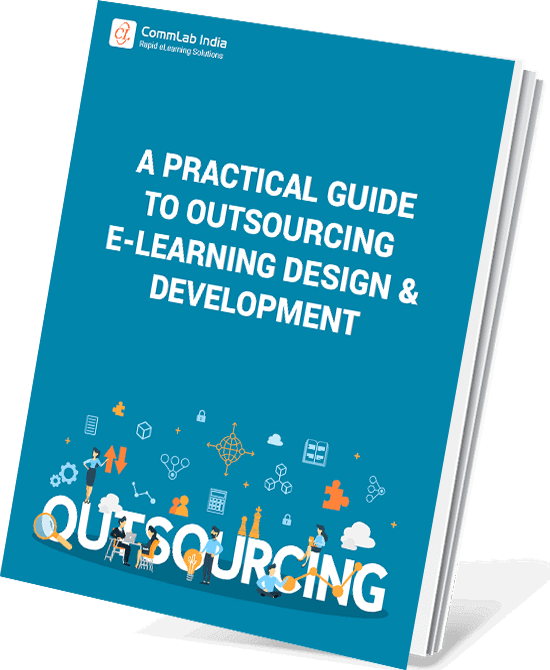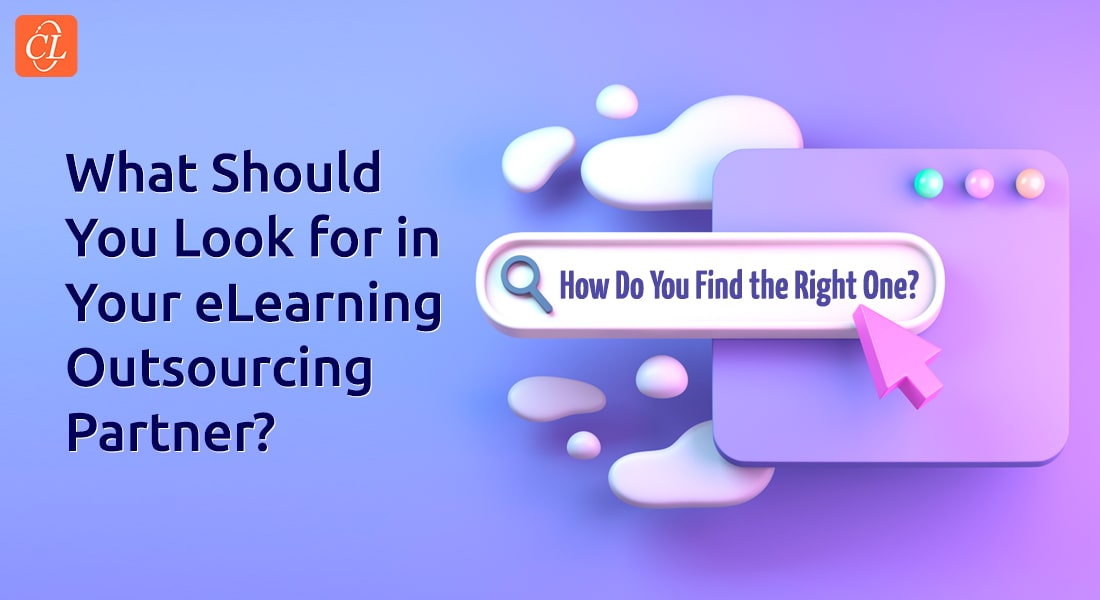Streamline Your Search: Criteria for Evaluating eLearning Outsourcing Companies

The corporate landscape is undergoing a paradigm shift towards a more digital and knowledge-based environment. In this evolving scenario, eLearning has emerged as a powerful tool for employee training and development. This has led to a surge in the demand for eLearning outsourcing services. However, with a plethora of eLearning outsourcing companies vying for your attention, selecting the right partner can be a daunting task. This blog post will equip you with the essential criteria for evaluating eLearning outsourcing companies and guide you toward a streamlined selection process.
→ Download Now: eLearning Outsourcing — Best Practices to Make the Smart Choice
Table of Contents
- Why is it Important to Select the Right eLearning Outsourcing Partner?
- What Are Your eLearning Outsourcing Needs?
- What Goals and Objectives Do You Want to Achieve Through eLearning Outsourcing?
- How Do You Evaluate eLearning Outsourcing Companies?
Why is it Important to Select the Right eLearning Outsourcing Partner?
The decision to outsource eLearning development is a strategic one. The chosen partner will play a crucial role in shaping your employee training programs and impacting your overall learning objectives. A well-matched partner can bring a wealth of expertise, resources, and innovative approaches to the table, resulting in high-quality, engaging eLearning modules that resonate with your learners. Conversely, a poor choice can lead to delays, budget overruns, and subpar training materials that fail to meet your expectations.
Do You Think Evaluating eLearning Outsourcing Companies is Quite Troublesome?
Well, here’s the criteria for it
- Expertise and experience
- Instructional design and capabilities
- Project management
- Portfolio, client references, and quality assurance
- Cultural fit
No, learners tend to lose focus with text-heavy courses. Visuals like charts, images, and videos enhance learner engagement and knowledge retention.
What Are Your eLearning Outsourcing Needs?
Before embarking on your search for an eLearning outsourcing company, it's crucial to have a clear understanding of your specific needs. Here are some key questions to consider:
- What are your training objectives? What knowledge, skills, or attitudes do you want your learners to acquire?
- Who is your target audience? Consider their demographics, learning styles, and technical proficiency.
- What is your budget? Be realistic about the resources you can allocate towards eLearning development.
- What is your preferred timeline for completion? Establish a clear timeframe for the development and deployment of your eLearning modules.
- Do you have any specific learning management system (LMS) requirements?
By having a well-defined roadmap, you can attract eLearning outsourcing companies that are best equipped to cater to your unique requirements.

A Practical Guide to Outsourcing E-Learning Design & Development
Tips and Best Practices for an Effective Outsourcing Journey
- eLearning Elements that can be Outsourced
- Tasks Before Outsourcing
- Tips for Selecting the Right eLearning Vendor
- Ways to Support Your Vendor
What Goals and Objectives Do You Want to Achieve Through eLearning Outsourcing?
Once you have a firm grasp of your needs, identify the specific goals and objectives you aim to achieve through eLearning outsourcing. This could include:
- Improved employee knowledge retention: Engaging eLearning courses can help employees retain information more effectively compared to traditional training methods.
- Enhanced employee performance: Well-designed eLearning programs can equip employees with the necessary skills to perform their jobs more efficiently and effectively.
- Reduced training costs: Outsourcing eLearning development can lead to significant cost savings in the long run.
- Increased learner engagement: Interactive and visually appealing eLearning modules can boost learner motivation and improve overall training outcomes.
Having a clear understanding of your goals will help you evaluate eLearning outsourcing companies based on their ability to deliver measurable results that align with your strategic learning objectives.
How to Align Objectives with Business Goals for eLearning Development? [Video]
How Do You Evaluate eLearning Outsourcing Companies?
Now that you have a comprehensive understanding of your needs and goals, let's delve into the key criteria for evaluating eLearning outsourcing companies:
1. Expertise and Experience
Look for a company with a proven track record of success in developing eLearning solutions for your industry or a similar domain. A seasoned eLearning development company possesses a deep understanding of the latest instructional design methodologies and technological advancements. Their experience allows them to translate complex concepts into engaging learning experiences.
2. Instructional Design (ID) Capabilities and Technical Expertise
The company should have a team of experienced instructional designers who can translate your training objectives into engaging and effective learning experiences. Evaluate the company's ability to create high-quality content that is clear, concise, and tailored to your target audience.
You should also ensure the company possesses the necessary technical skills to develop eLearning modules that seamlessly integrate with your LMS and function flawlessly across different devices. Additionally, here are a few popular eLearning authoring tools they need to have expertise at, or at least in two of them.

3. Project Management
The company should have a robust eLearning project management process in place to ensure that your eLearning projects are delivered on time and within budget. Look for clear communication channels and a collaborative approach to project management. Also, by outsourcing eLearning development, you can free up your internal resources to focus on your core competencies. This allows you to streamline operations and improve overall efficiency.
4. Portfolio, Client References, and Quality Assurance
- Request a comprehensive portfolio of previous projects. Analyze the quality, design, and overall effectiveness of their online learning solutions. This will give you valuable insights into their capabilities and style.
- Ask for client testimonials or case studies. Reach out to past clients to gain firsthand insights into their experiences working with the company.
- Inquire about the company's quality assurance procedures. Ensure they have a rigorous testing process in place to identify and rectify errors before the final product is delivered.

A Practical Guide to Outsourcing E-Learning Design & Development
Tips and Best Practices for an Effective Outsourcing Journey
- eLearning Elements that can be Outsourced
- Tasks Before Outsourcing
- Tips for Selecting the Right eLearning Vendor
- Ways to Support Your Vendor
5. Pricing and Cost Transparency
A good outsourcing partner can adapt to your changing training needs. They can seamlessly scale their services up or down as your requirements evolve. Outsourcing can offer significant cost savings compared to building an in-house eLearning development team. You can access a pool of skilled professionals without incurring additional overhead costs associated with recruitment, training, and infrastructure. Request a detailed proposal outlining the scope of work, pricing structure, and any associated costs. Evaluate whether their pricing model aligns with your budget and whether they offer transparent billing practices.
6. Cultural Fit
The ideal outsourcing partner should understand your organization's culture and values. This will ensure a smoother collaboration and better alignment with your overall business goals.
How to Ensure Effective Collaboration with Your Outsourcing Partner?
Before we start discussing the various tips, here is a short checklist that will help you choose your outsourcing partner.

Once you've selected an eLearning outsourcing company, follow these tips to ensure a successful and productive partnership:
- Clear Communication: Establish open and regular communication channels from the outset. Set clear expectations and timelines and provide regular feedback throughout the development process.
- Provide Subject Matter Expertise (SME) Access: Your outsourcing partner will need access to your in-house subject matter experts to ensure the accuracy and relevance of the eLearning content.
- Detailed Project Plan: Collaborate with the outsourcing partner to develop a detailed project plan. Identify key milestones, potential risks, and appropriate contingency plans.
- Regular Progress Reviews: Schedule regular progress reviews to assess the development process, address any concerns, and make necessary adjustments.
- Post-Launch Evaluation: After launching your eLearning modules, measure their effectiveness against your predefined goals and learning objectives. Gather feedback from learners to identify areas for improvement and inform future eLearning initiatives.

A Practical Guide to Outsourcing E-Learning Design & Development
Tips and Best Practices for an Effective Outsourcing Journey
- eLearning Elements that can be Outsourced
- Tasks Before Outsourcing
- Tips for Selecting the Right eLearning Vendor
- Ways to Support Your Vendor
Wrapping Up!
Selecting the right eLearning outsourcing partner requires careful consideration and a structured evaluation process. By assessing companies based on their core competencies, experience, project management processes, client testimonials, and cultural fit, you can increase your chances of finding a partner who will deliver top-notch eLearning solutions that drive employee growth and organizational success.
Struggling to Find the Perfect eLearning Partner? Download our FREE eBook: Selecting the Right eLearning Vendor and discover expert tips to find the ideal partner for your training needs.
Editor’s note: This post was originally published on April 25, 2024 and has been updated for comprehensiveness.





